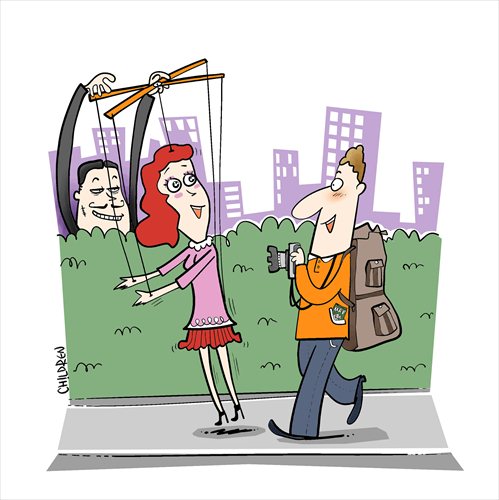On World Consumer Rights Day one expat tells how he was scammed

Many scammers target foreigners in Shanghai. Illustration: CFP
Today is World Consumer Rights Day and, while Shanghai is generally an extremely safe city, there are still some fraudsters out there who want to scam money from you. Western visitors and tourists are major targets.
Many people, like the German engineer who talked to the Global Times about his expensive experience, have lost money and been upset by accepting what they thought were innocent and charming invitations.
The 20-something German works for a major German automotive company.
The tea house scam
Most Chinese people are friendly and I feel very safe and protected here. But in a few situations (not too often) I can't understand the pricing. Especially when buying fruit in the market - the prices increase every time I buy something there. I first bought four apples there for 7.8 yuan ($1.21). The next time five apples cost me 12 yuan and the time after that five apples cost me 17 yuan. Maybe it's seasonal or a "first time" special offer deal. It just cost a few yuan and the people there don't earn much money, so I don't want to complain. But the one time I was invited to a "tea experience" it was really serious scamming and very expensive.
It was January 23. It started innocently in People's Square. A group of four girls asked me to take their photograph. After returning the smartphone we started chatting and they said: "Germany, how nice!" They told me they were students from Beijing and were visiting Shanghai for a few days. All of them spoke good English and one of them even spoke German - she said she was studying it.
My original plan was to visit the Shanghai Museum but they told me that they had just come from the museum and it wasn't worth going there at that time because of the crowds. They said they were going to attend a special tea festival which was just on that weekend and it was very famous.
"Germany has Oktoberfest, Shanghai has this tea festival," they told me. I thought it was like a market or exhibition with different teas and tastings. They suggested I follow them.
They were joking around and paid a lot of compliments to me and to Germany. We left the main roads and entered a smaller, less crowded street. We never stopped talking and they explained a lot of the things we saw along the street. After 10 minutes walk we reached a small shop with just one room. A girl welcomed us there and we sat down at a table. I noticed there were several security cameras in the room.
It was a weird situation. I asked them a few tricky questions in the hope that they would give themselves away but they all gave similar answers so I believed they were for real. I looked at the menu and the prices seemed to be cheap.
A pleasant occasion
The waitress then started explaining something and the girls told me she came from Sichuan Province which was famous for its tea. The waitress didn't speak any English but she prepared the first cup for us and we tasted it. The girls were translating what the waitress was saying and asking questions - they never stopped talking. We tasted several different teas and it was a pleasant occasion.
After tasting six or eight teas they asked me which one I preferred and encouraged me to buy some. I got the tea buying menu - the prices were expensive but I felt a little pressured to buy something after tasting all the teas. I thought that maybe the price would be acceptable though I didn't know what sort of quality the tea would actually be.
The girls ordered a large packet of tea and, after some thought, I agreed to buy a small packet. We continued talking for quite a while and then asked for the bill. Even by then it was not obvious that the girls and the waitress were colluding but then the girls asked me to pay some of their bill. "You are a gentleman, aren't you?" The bill was a big shock but I was the only one who was shocked. I tried to understand the bill and was complaining while they tried to calm me down. "This is special in China and very good. It's worth it."
I was angry and kept complaining. One problem was that I couldn't explain anything to the waitress because she didn't speak English.
The first bill was for 1,100 yuan. I asked for another bill and said I didn't want to pay anything for the tea the girls had ordered. This reduced my bill to 661 yuan but this was still horrendously expensive. For two hours work this was a good income for the teahouse.
I was completely stunned by what had happened and couldn't collect or keep any evidence that I might have been the victim of a scam. And I didn't want to get too loud or start insulting them. There were the security cameras in the room and I was in an unknown street in China. I didn't want any more trouble so I ended up paying the bill. I just wanted to get out of there without any more trouble. To try to placate me they gave me another small box of tea.
I think this was a typical women seducing a man scheme. I had read warnings about this sort of scam before - the way they complimenting you, talking a lot, distracting you from the important things. I thought I was clever enough to spot hustlers but they were very good. They had great explanations, and I believed them. I was really upset and angry at myself that I hadn't spotted this fraud. I'm ashamed of my stupidity and this is the first time I have told my story. I just want to warn others about this scam.
I didn't report this to the police. They showed me the menu with the prices, there were security cameras there, it was transparent. I think I have nothing to go to the police about.
But this hasn't changed the way I think about Shanghai. I still think Shanghai is safe and (most) people here are friendly and honest.
The Global Times talked to two experienced Shanghai expats about living in the city.

Joel Jean-Baptiste France (lived in Shanghai for more than nine years)
I used to bargain to the price I was willing to pay. The rule of thumb was three times less than I would pay in my home country. I think vendors should put a price tag on everything instead of pulling out a calculator.
I never really enjoy bargaining and I wish merchants would guarantee quality regardless of price. Having to check every product you buy is irritating; I should be able to trust a vendor. Now I don't bother with vendors - for the past five years I have been getting all my items from brand name and reputable stores.

Zane Mellupe Latvia (lived in Shanghai for more than 10 years)
Ten years ago I would often overpay. Now due to online shopping, prices have become more transparent and easier to compare. I have talked with Chinese friends and I feel that I can buy some things cheaper than they can. Especially things related to art materials because I tend to buy more.
Overcharging still happens with foreigners a lot and newly arrived people get overcharged the most. Apartment scams also happen to foreigners. It depends on different things but expats usually pay 20 to 30 percent more. One reason could be that they are not accustomed to bargaining. If you go to the fake markets you can pay 30 or 300 yuan for the same thing, depending on whether you bargain or not.
The Chinese vendors know that most foreigners don't know the market prices in China and trade on that. Foreigners only realize they have been cheated when they discuss this with others.
But in many cases foreigners realize they are being overcharged and just pay the price they feel comfortable with because it's still much cheaper than back in Europe.
Here are some of the other common scams targeting foreigners.
The art student
Generally speaking the students in Shanghai are very friendly and many speak good English. But if you encounter a student who offers to take you somewhere be very careful.
Often "art students" approach visitors enticing them to come to a gallery to see their exhibition. It's pretty much like the tea ceremony and they try to persuade people to buy some of their art "at big discounts." But the art works are overpriced (sometimes 10 times their real value), of poor quality and are often just prints in fact.
The bicycle repair guy
If you're out riding a bike and find one of the tires is flat you might think yourself lucky when a kindhearted man pops up out of nowhere and offers to fix it for you. Be careful. Often the nice guy is in cahoots with the person who actually punctured your tire and he will charge you a lot more than he should to repair it. The going rate for a new tire in the city is about 50 yuan.
Taxi fake money
Dishonest taxi drivers have this clever scam which involves a little sleight-of-hand. When a costumer hands over a 100-yuan note to pay the fare, the driver looks at it closely and then hands it back, saying it's a fake. He asks for another 100-yuan note. What he has actually done is substitute a fake note for the customer's, leaving the client 100 yuan short.
It's best to carry a selection of smaller notes, or watch the driver very carefully when you pay.
Another taxi scam involves public transportation cards. When the customer hands this over to pay the fare, the driver hands back an identical card but one with no credit on it. Mark your card with a sticker or a pen in some way to avoid this happening to you.
Newspaper headline: Not my cup of tea!